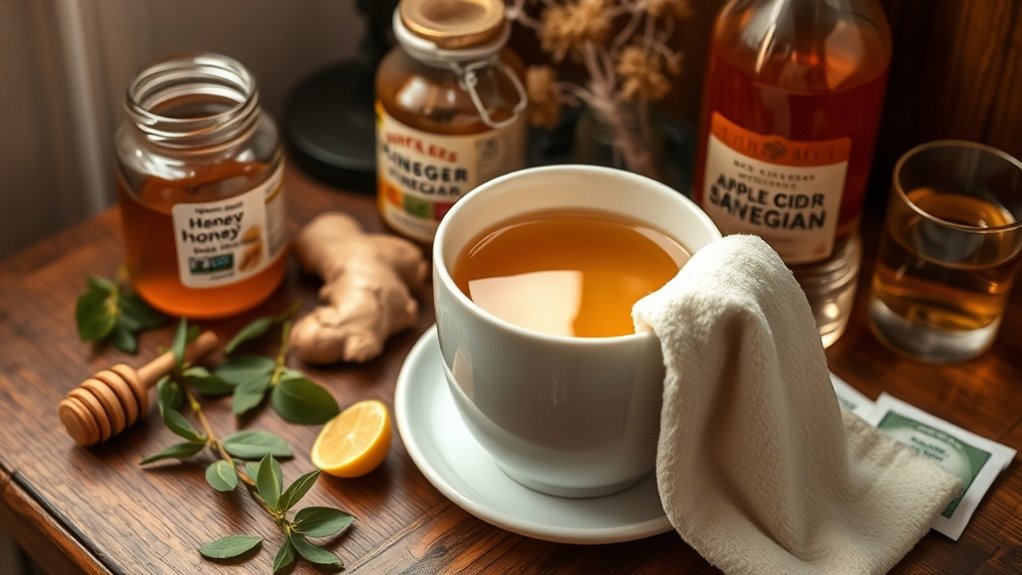My Go-To Sore Throat Remedy You Can Try at Home
A great remedy for a sore throat is a saltwater gargle; mix ½ teaspoon of salt in 8 ounces of warm water and gargle several times a day. You can also try mixing ¼ teaspoon of baking soda with salt for additional relief. Honey is another effective option—mix it with warm water or herbal tea to soothe irritation. Staying hydrated and resting are crucial too. Explore other remedies that can complement these methods for even better relief.
Saltwater Gargle
When searching for relief from a sore throat, have you considered the effectiveness of a saltwater gargle?
This natural sore throat remedy eases pain and inflammation while loosening mucus. By gargling a solution of ½ teaspoon salt in 8 ounces of warm water several times a day, you can coat your throat and reduce discomfort. Saltwater raises pH levels, making it hard for viruses and bacteria to thrive. It also helps maintain oral hygiene by decreasing harmful bacteria. Additionally, this remedy prevents infections by blocking viruses and bacteria from entering the body. Furthermore, gargling salt water can lower the risk of upper respiratory infections by up to 40%. Keep in mind, though, it’s supportive and doesn’t cure underlying infections; seek medical help if symptoms persist or worsen.
Baking Soda Gargle
Another effective remedy worth considering is a baking soda gargle. Mix ¼ teaspoon of baking soda and ⅛ teaspoon of salt in 1 cup of warm water. Gargle this solution three to four times daily for optimal relief. This mixture helps neutralize acids, soothe throat irritation, and break up mucus, offering comfort during painful episodes. Additionally, baking soda has antimicrobial properties that can reduce bacterial and fungal growth, enhancing your oral health. Gargling with salt water also contributes to a clean throat and quick relief, making it a complementary approach for sore throat troubles. Furthermore, studies indicate that salt-water gargling can reduce throat pain by 40% within 24 hours, providing a significant boost to your overall healing process.
After gargling, rinse your mouth with plain water to eliminate residue.
This affordable remedy can be a great addition to your sore throat treatment toolkit.
Honey as a Soothing Agent
Honey offers remarkable benefits for soothing a sore throat due to its antimicrobial properties, which help fight infections. You can mix it with warm water or tea for relief, making it a versatile option. Historically, honey has been used for its calming effects, proving its efficacy as a natural remedy. Additionally, its anti-inflammatory effects can further reduce throat irritation and enhance the soothing experience. Furthermore, honey’s natural antibacterial compounds also contribute to its effectiveness in alleviating throat discomfort.
Antimicrobial Properties Explained
A natural remedy for relieving sore throats often lies in the unique antimicrobial properties of honey.
Its high sugar content creates an osmotic effect that dehydrates bacteria, inhibiting growth.
Honey’s low moisture content complements this, while gluconic acid maintains an unfavorable pH for bacterial proliferation. Additionally, hydrogen peroxide gradually releases, providing antiseptic action. Enzymatic hydrogen peroxide production provides the core antibacterial activity of honey.
Bee defensin-1 and methylglyoxal found in Manuka honey contribute to its strong antibacterial efficacy.
These properties make honey effective against pathogens like Staphylococcus aureus and E. coli, helping reduce bacterial load and alleviate sore throat discomfort.
Consider using honey for its potent antimicrobial benefits.
Mixing Techniques for Relief
Using honey in different mixtures can significantly soothe your sore throat.
Here are some effective combinations:
- Honey and Water: Mix two tablespoons of honey with warm water.
- Honey in Tea: Combine honey with herbal tea for added comfort.
- Warm Honey Lemon Water: Mix raw honey with lemon juice in warm water to coat your throat.
- Honey and Apple Cider Vinegar Gargle: Gargle this mix to target throat pain.
- Cold Treats with Honey: Add honey to popsicles for icy relief.
These techniques harness honey’s natural soothing and anti-inflammatory properties, making your throat feel better quickly. Additionally, honey has been noted for its antimicrobial capacity, which can further assist in alleviating throat discomfort.
Historical Uses of Honey
Throughout history, honey has been revered as a powerful soothing agent, employed in various cultures for its healing properties. Ancient Egyptians used it for wound treatment, while Hippocrates recommended honey for sore throats. Its antibacterial and anti-inflammatory qualities made honey a staple in traditional medicine across civilizations.
| Culture | Use of Honey | Medicinal Properties |
|---|---|---|
| Ancient Egyptians | Wound treatment, mummification | Preservative, antibacterial |
| Greeks | Treating ulcers | Soothing, anti-inflammatory |
| Ayurveda | Balancing body humors | Antibacterial, digestive aid |
Benefits of Herbal Teas
Herbal teas offer significant benefits for soothing a sore throat, primarily through their anti-inflammatory properties.
Varieties like chamomile and licorice root can help reduce throat swelling, making you feel more comfortable.
Additionally, ingredients such as elderberry can boost your immune system, aiding in faster recovery from infections. Furthermore, herbal blends like chamomile can also calm nerves and ease anxiety, contributing to a more restful experience while you recover.
Anti-Inflammatory Properties
Explore the remarkable anti-inflammatory properties of various herbal teas that can soothe your sore throat and promote overall health. These teas offer natural relief thanks to their beneficial compounds:
- Green Tea: Reduces chronic inflammation with high flavonoids.
- Turmeric Tea: Contains curcumin, a potent anti-inflammatory agent.
- Rosehip Tea: Rich in antioxidants and inhibits pro-inflammatory chemicals.
- Ginger Tea: Soothes inflammation with compounds like gingerol.
- Fennel Tea: Contains phenolic compounds that help reduce inflammation.
Incorporating these herbal teas into your routine can be a delicious way to relieve discomfort and enhance your well-being.
Immune System Support
Have you ever considered how herbal teas can bolster your immune system? These teas are packed with antioxidants, support gut health, and enhance immune cell activity. Check out the benefits of some popular herbal teas:
| Tea | Key Benefits | Immune Support |
|---|---|---|
| Green Tea | Rich in EGCG, neutralizes free radicals | Boosts immune response |
| Ginger Tea | Aids digestion, promotes gut bacteria | Strengthens immunity |
| Echinacea Tea | Stimulates white blood cells | Enhances infection resistance |
| Licorice Root | Acts as prebiotic | Nourishes probiotics |
| Ashwagandha Tea | Reduces stress | Improves immune efficiency |
Incorporate these teas for a healthier you!
Apple Cider Vinegar Remedy
Apple cider vinegar (ACV) can be a popular home remedy for soothing sore throats.
Known for its antimicrobial properties, ACV may offer some symptom relief.
Try these preparation methods:
- ACV-honey mix: 1 tbsp ACV + 2 tbsp honey in warm water
- ACV tea: 1-2 tsp ACV + lemon juice + green tea
- Dilute with water: 1-2 tsp per cup
- Add lemon for vitamin C, turmeric for inflammation
- Use cautiously—undiluted ACV can irritate
While many claim benefits, remember that there’s no conclusive evidence for its effectiveness against severe throat infections. Additionally, its potential health effects suggest that ACV could be useful for managing conditions like blood sugar levels.
Prioritize rest and hydration instead.
Additional Home Remedies
While sore throats can be painful and frustrating, several additional home remedies can provide relief alongside apple cider vinegar.
Gargling with saltwater reduces swelling and clears secretions—aim for hourly rinses.
Baking soda gargles, combining baking soda and salt, can be gentler and effective 3–4 times daily.
Herbal teas like chamomile or peppermint soothe irritation with anti-inflammatory properties.
Consider a sage-echinacea spray for its antimicrobial benefits.
Additionally, consuming honey or cool soft foods can coat the throat and suppress coughs.
Stay away from irritants like spicy or crunchy foods to avoid exacerbating pain. Common bacterial infections such as strep throat may require professional medical assessment if symptoms persist.
Importance of Rest and Hydration
Rest and hydration are crucial when you’re battling a sore throat, as they directly impact your recovery.
By prioritizing both, you help your body fight off the infection effectively.
- Rest conserves energy and reduces immune system strain.
- Adequate sleep strengthens immune response and helps regulate stress hormones.
- Hydration keeps your throat moist, alleviating discomfort.
- Proper fluid intake aids white blood cell production for fighting infections.
- Avoiding dehydration can prevent prolonged symptoms and complications.
Additionally, adequate rest allows the immune system to release cytokines, which are vital for combating the infection.
Combining rest and hydration not only speeds up recovery but also prepares your body for future challenges.
Take care of yourself, and you’ll feel better sooner!
Tips for Symptom Relief
When dealing with a sore throat, finding effective relief is essential for comfort and recovery.
Start by sipping warm liquids like herbal teas, which can soothe and reduce inflammation.
Broths and warm water with honey offer hydration and relief—just avoid honey for children under one.
Gargling with saltwater or a saline solution helps minimize swelling and cleanse the throat.
Cold treats, like ice pops and smoothies, provide temporary numbing relief.
Additionally, using a humidifier and maintaining a calm environment can further alleviate discomfort.
Simple adjustments can make a big difference in your recovery process. Consider using honey and turmeric in your regime, as this ancient remedy has been shown to provide significant soothing effects.








